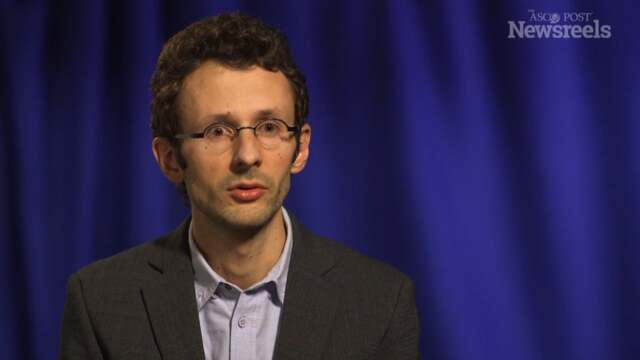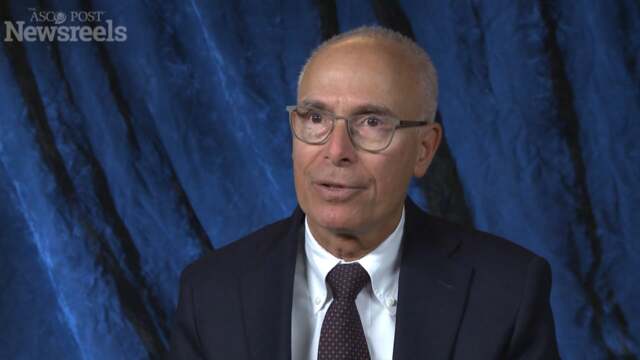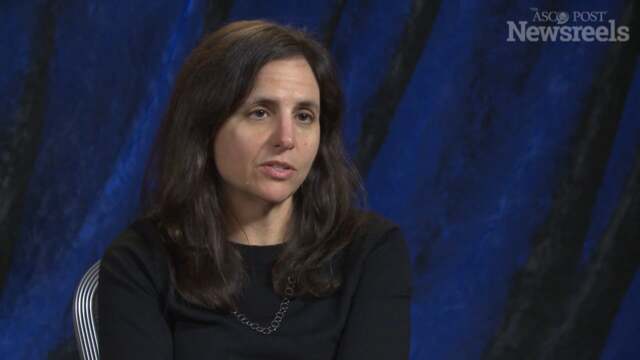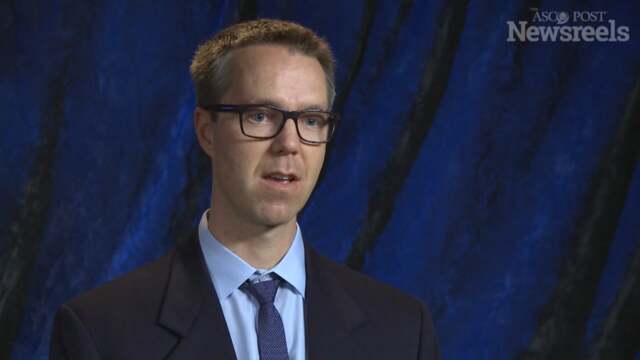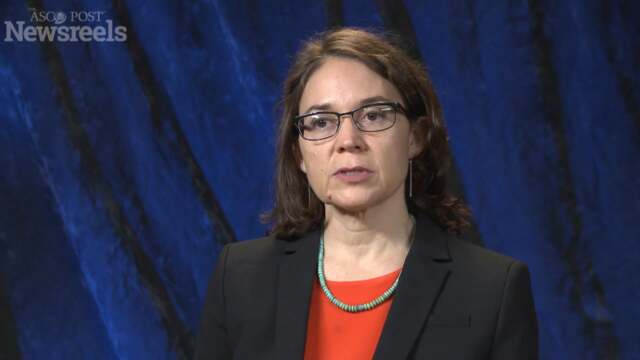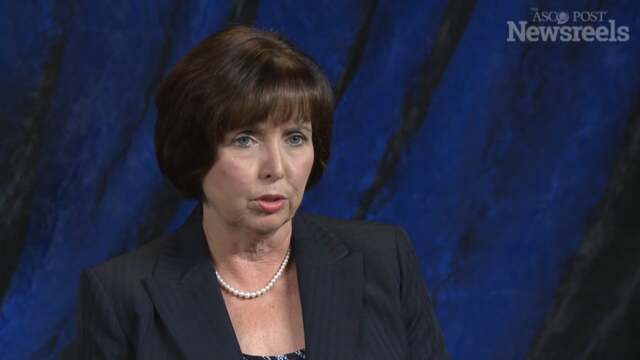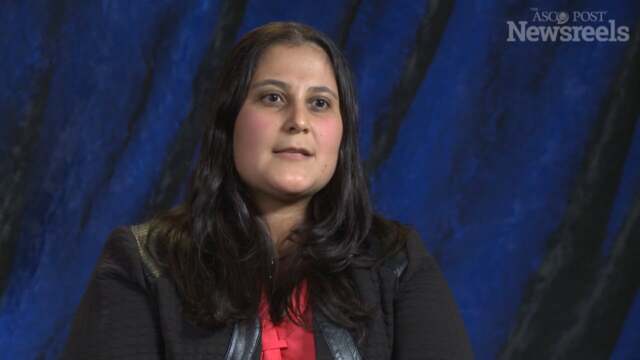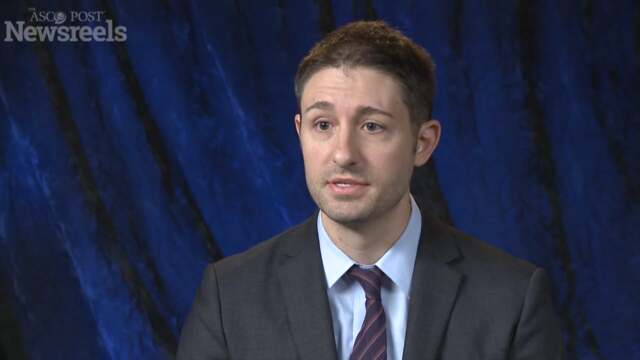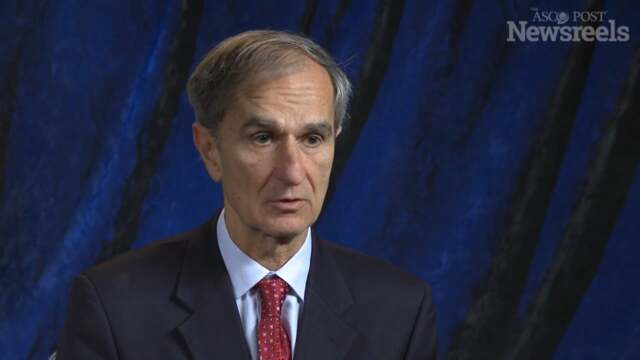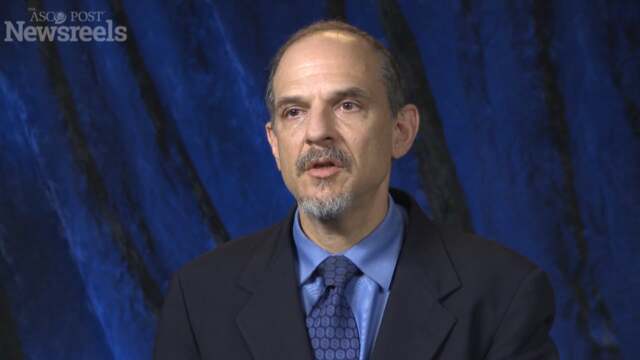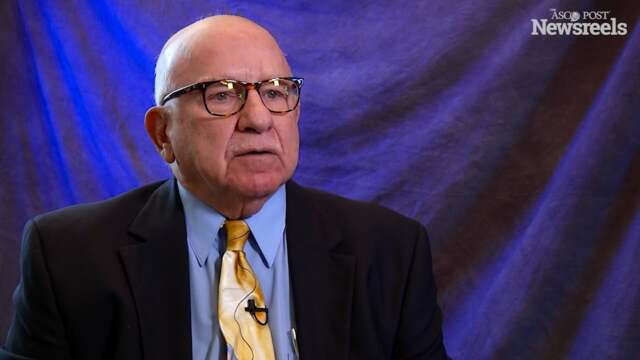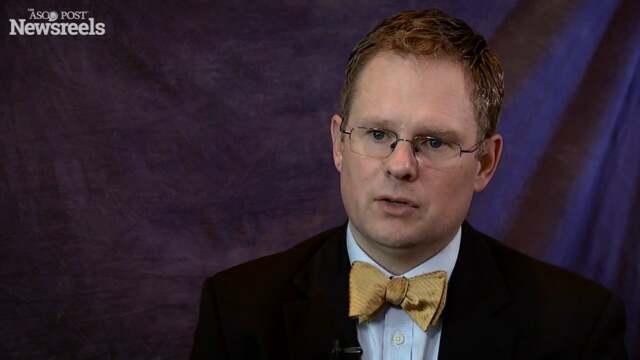Philippe Rochigneux, MD, on Solid Tumors: Use of Chemotherapy Near the End of Life
Philippe Rochigneux, MD, of the Paoli Calmettes Institute, Marseille Cancer Center, discusses his findings on the high rates of chemotherapy used at the end of life for metastatic solid cancer, especially in young patients treated in high-volume centers without a palliative care unit. (Abstract 1300O)
Why Care About the Caregivers?
Caregivers of patients with cancer provide invaluable health-care services, but they are an underserved and undervalued group, with many unmet needs. Early palliative care may provide important benefits to these often tireless individuals, according to J. Nicholas Dionne-Odom, PhD, RN, ACHPN, of...
Benefits of Early Palliative Care Interventions Extend Beyond the Patient
A session at the 2016 Palliative Care in Oncology Symposium focused on the special needs of cancer caregivers. In a large survey, caregivers of persons with cancer reported higher levels of stress and significantly more duties than caregivers of other patients. But, according to research from...
Palliative Care: Let’s Use the Tools We Already Have
Clinicians and researchers in the field of palliative and supportive care are enjoying the recognition the field is now receiving and expecting the future to be ripe with opportunity. But one thought leader in this specialty had a suggestion for attendees at the 2016 Palliative Care in Oncology...
Pearls for Managing Immune-Related Toxicities
With checkpoint inhibitors in frequent use, clinicians strive daily to balance the efficacy and toxicity of these treatments. At the 2016 Palliative Care in Oncology Symposium, Lynn M. Schuchter, MD, FASCO, the C. Willard Professor of Hematology-Oncology at the University of Pennsylvania,...
Immunotherapy Brings Unique Challenges for Clinicians
The advent of immunotherapies has created a number of interesting challenges for oncology providers. At the 2016 Palliative Care in Oncology Symposium, specialists in the field tackled these issues. “There is a lot of newness to how we approach patient care with immunotherapies on board,” said...
Bridging the Gap in Oncology Care
The third annual Palliative Care in Oncology Symposium, held on September 9–10, 2016, in San Francisco, California, brought together more than 650 attendees from multiple countries, including the United States, Canada, the United Kingdom, France, Italy, and China. It featured over 250 study...
Palliative Care 2016: Rehospitalization of Patients With Advanced Cancer in the Year After Diagnosis
Among individuals with advanced cancer, frequent hospitalization is often at odds with patient preference and is increasingly viewed as a hallmark of poor quality care. Hospitalization contributes substantially to costs and regional spending variation in this population, but patterns and reasons...
Palliative Care 2016: Attitudes of ASTRO Members Toward Palliative and Supportive Care in the United States
Radiation oncologists are frequently involved in providing palliative and supportive care for patients with advanced cancers through delivery of palliative radiation. Whether they are confident in their ability to assess and initiate treatments for pain, nonpain, and psychosocial distress is...
Palliative Care 2016: Usage of Oregon’s Death With Dignity Act
In 1997, Oregon enacted a voter initiative allowing terminally ill residents to self-administer physician-prescribed medication to end their lives called the Oregon Death With Dignity Act (ORDWDA). Statute requires prescriptions written for lethal medications be reported; the state also collects...
Palliative Care 2016: Inpatient Palliative Care in Patients Hospitalized for HSCT
During hematopoietic stem cell transplantation (HSCT), patients sometimes experience physical and psychological symptoms that negatively impact their quality of life. Researchers led by Areej El-Jawahri, MD, Instructor of Medicine at Harvard Medical School, Director of the Bone Marrow Transplant...
Palliative Care 2016: Perception of Curability in Patients With Advanced Cancer Receiving Palliative Care
There are limited data on the illness understanding and perception of curability among patients with advanced cancer receiving palliative care around the world. In a study led by Sriram Yennu, MD, MS, Associate Professor in the Department of Palliative Care and Rehabilitation Medicine at The...
Randy L. Wei, MD, PhD, on Radiation Oncologists and Palliative Care
Randy L. Wei, MD, PhD, of the University of California, Irvine, discusses findings from a survey that focused on ASTRO members who assessed their ability to deliver palliative and supportive care, and their access to continuing medical education on the topic (Abstract 105).
Sriram Yennu, MD, on Patient Perception of Curability
Sriram Yennu, MD, of The University of Texas MD Anderson Cancer Center, discusses findings from a study of an international cohort of patients with advanced cancer who received palliative care. Nearly half the patients incorrectly believed their cancer was curable (Abstract 5).
Stephen T. Sonis, DMD, DMSc, on Radiotherapy-Induced Oral Complications
Stephen T. Sonis, DMD, DMSc, of Dana-Farber Cancer Institute, discusses the epidemiology, pathogenesis, and scope of oral complications of radiation therapy.
Jennifer S. Temel, MD, on The Changing Conversation Around Prognostication
Jennifer S. Temel, MD, of Massachusetts General Hospital, discusses increasing prognostic uncertainty in light of targeted treatments and immunotherapies, and the difficulty predicting who will benefit.
Scott A. Irwin, MD, PhD, on Dealing With Delirium
Scott A. Irwin, MD, PhD, of Cedars-Sinai’s Samuel Oschin Comprehensive Cancer Institute, discusses delirium—its definition, prevalence, consequences, assessment, and management.
Eric Roeland, MD: Expert Perspective on Palliative Care in Oncology Meeting Highlights
Eric Roeland, MD, of the University of California, San Diego, discusses the key papers presented at this year’s Palliative Care in Oncology Symposium.
Emily Haozous, PhD, RN, on Cultural Differences in End-of-Life Care
Emily Haozous, PhD, RN, of the University of New Mexico, discusses health disparities and cultural differences in palliative and end-of-life care, with case study examples drawn from American Indian communities.
Eileen Danaher Hacker, PhD, APN, AOCN: After Stem Cell Transplant: Enhancing Recovery With Strength Training
Eileen Danaher Hacker, PhD, APN, AOCN, of the University of Illinois at Chicago, discusses study findings that show improvement in physical activity, fatigue, muscle strength, and functional ability (Abstract 190).
Charles F. von Gunten, MD, PhD, on Referrals for Hospice Care: A Quality Improvement Approach
Charles F. von Gunten, MD, PhD, of OhioHealth, discusses hospice care as a measure of quality, and findings that show medical oncologists doubled the median length of hospice service from 20 days to 40 days (Abstract 45).
Joseph A. Greer, PhD, on An App for Adherence to Oral Chemotherapy
Joseph A. Greer, PhD, of Massachusetts General Hospital, discusses the development of a mobile application to address treatment adherence and symptoms (Abstract 104).
Areej El-Jawahri, MD, on Hematologic Malignancies: Integrating Palliative Care in Treatment
Areej El-Jawahri, MD, of Massachusetts General Hospital, discusses ways in which palliative care can reduce symptoms, improve quality of life, reduce depression and anxiety, and potentially optimize end-of-life care for patients with hematologic malignancies.
J. Nicholas Dionne-Odom, PhD, on Supporting Family Caregivers: The ENABLE Model
J. Nicholas Dionne-Odom, PhD, of the University of Alabama at Birmingham, discusses the “hidden” health-care workforce of family caregivers and what clinicians can do to help ease the burden on families.
James F. Cleary, MD, on Global Access to Opioids
James F. Cleary, MD, of the University of Wisconsin Carbone Cancer Center, talks about the many reasons that 80% of the world’s population lacks access to opioids, the mainstay of cancer pain management.
Tracy A. Balboni, MD, MPH, on Managing Spinal Metastases With Radiation Therapy
Tracy A. Balboni, MD, MPH, of the Dana-Farber Cancer Institute, talks about how to preserve quality of life in the presence of complex spinal lesions, including novel ways to assess spinal instability and treat metastases.
Eduardo Bruera, MD, on Managing Opioid Use in Patients With a History of Addiction
Eduardo Bruera, MD, of The University of Texas MD Anderson Cancer Center, discusses the need for outpatient palliative care programs to monitor and support these complex patients and their family members.
Charles D. Blanke, MD, on Oregon’s Death With Dignity Act
Charles D. Blanke, MD, of the Oregon Health & Science University and Southwest Oncology Group, discusses the nearly 20 years’ experience with Oregon’s Death With Dignity (DWD) Act, a voter initiative that led to the first such law enacted in the United States (Abstract 44).
Hematologic Oncologists Surveyed on Quality Measures of End-of-Life Care
In a study reported in the Journal of Clinical Oncology, Oreofe O. Odejide, MD, MPH, of Dana-Farber Cancer Institute, and colleagues surveyed hematologic oncologists to identify acceptable end-of-life-care quality measures and barriers to such care. Respondents considered unrealistic patient...
Palliative Care 2016: 'Mystery Shopper' Study Finds Barriers to Accessing Palliative Care Services at Major Cancer Centers
A team of researchers, using a novel approach, found that while many cancer centers offer palliative and supportive care services, patients may face challenges when trying to access them. The study showed that expanding awareness and education to patient-facing cancer center employees about such...
Palliative Care 2016: Family Caregivers for Patients With Advanced Cancer Often Experience High Levels of Anxiety, Depression
A new multistate survey showed that nearly one-quarter to one-third of family caregivers of patients with high-mortality cancers experience high levels of depression and anxiety symptoms. The study also found that family caregivers can spend over 8 hours per day providing care and that as this time ...
Palliative Care 2016: Early Palliative Care Improves Coping, Quality of Life for Patients With Incurable Cancers
A randomized clinical trial found that introducing palliative care shortly after a diagnosis of certain metastatic cancers greatly increases a patient’s coping abilities, as well as overall quality of life. Researchers also found that early integration of palliative care results in an...
Palliative Care 2016: Cancer Caregivers Experience Unique Burdens Compared With Those Caring for Patients With Other Conditions
An analysis of data from more than 1,200 caregivers in the United States finds that cancer caregivers report a higher burden and spend significantly more hours per week caregiving, as opposed to individuals who care for people with other conditions. The analysis was based on survey data from the...
Integrating Early Palliative Medicine Into Oncology Care to Improve Patients’ Quality of Life
At the 2015 Palliative Care in Oncology Symposium in Boston, Vicki Jackson, MD, MPH, Chief in the Division of Palliative Care and Geriatrics at Massachusetts General Hospital, Co-Director of the Harvard Center for Palliative Care, and Associate Professor of Medicine at Harvard Medical School,...
Hematologic Oncologists Surveyed on Quality Measures of End-of-Life Care and Barriers to Such Care
In a study reported in the Journal of Clinical Oncology, Odejide et al surveyed hematologic oncologists to identify acceptable end-of-life-care quality measures and asked the clinician to identify barriers to such care. Respondents considered unrealistic patient expectations the top barrier to...
Despite Increasing Global Legalization of Physician-Assisted Suicide, Use Remains Rare
Despite increasing legalization of euthanasia and physician-assisted suicide worldwide, the practices remain relatively rare and, when carried out, are primarily motivated by psychological factors such as loss of autonomy or enjoyment of life, rather than physical pain. A new comprehensive...
Aggressive Treatment at the End of Life Continues to Be Common
Oncologists in the United States may need to improve their efforts to reduce unnecessary care for younger patients with terminal cancer over the last 30 days of life, based on the findings of a study reported at the 2016 ASCO Annual Meeting.1 Contrary to recommendations, aggressive care is still...
Ronald C. Chen, MD, MPH, on End-of-Life Care: Impact of the Choosing Wisely Campaign
Ronald C. Chen, MD, MPH, of the University of North Carolina at Chapel Hill, discusses the substantial overuse of aggressive medical care for younger patients at the end of life, despite ASCO recommendations (Abstract LBA10033).
ASCO 2016: Many Younger Cancer Patients Receive Aggressive End-of-Life Care Despite ASCO’s Choosing Wisely Campaign
An analysis of health claims data from 2007–2014 on more than 28,000 patients under the age of 65 found that a large proportion of patients with advanced solid tumors received at least one form of aggressive care within the last 30 days of life. The study was presented by Chen et al at...
Eric Roeland, MD, and Jennifer S. Temel, MD, on Integrative Palliative and Oncology Care
Eric Roeland, MD, of the University of California, San Diego, and Jennifer S. Temel, MD, of Massachusetts General Hospital, discuss findings that showed the benefits of offering palliative care integrated with oncology care (Abstracts 10003 and 10131).
ASCO 2016: Early Palliative Care Provides Benefits for Family Caregivers of Patients With Cancer
A randomized clinical trial found that introducing palliative care shortly after a cancer diagnosis results in better quality of life and fewer symptoms of depression among family caregivers. According to the authors, the study is the first to show that early palliative care alone for a...
Earlier Hospice Enrollment, Avoiding ICU Admissions, and Not Dying in the Hospital Associated With Perceptions of Better End-of-Life Care
Three measures of aggressive end-of-life care “were associated with relatively large differences in family member–reported quality ratings for end-of-life care and a lower likelihood that patients with advanced-stage cancer received care congruent with their preferences,” according to a study in...
Joseph Simone, MD: Highlights of the 21st Annual NCCN Conference
Joseph V. Simone, MD, of the Simone Consulting Company, gives his expert perspective on the important messages of this year’s meeting.
Toby C. Campbell, MD, on Palliative Care: Patient and Provider Perspectives
Toby C. Campbell, MD, of the University of Wisconsin Carbone Cancer Center, discusses palliative care, hospice care, and best supportive care practices, as well as the challenges of symptom management and end-of-life issues.
Site of Death, Health-Care Utilization, and Hospital Expenditures for Patients Dying With Cancer in Developed Countries
In a study reported in JAMA, Bekelman et al assessed the site of death, health-care utilization, and hospital expenditures among patients aged ≥ 65 years dying with cancer in Belgium, Canada, England, Germany, the Netherlands, Norway, and the United States. The United States had lower...
2015 Palliative Care in Oncology Symposium Highlights
The Palliative Care in Oncology Symposium, held October 9–10, 2015, in Boston, Massachusetts, brought together more than 670 members of the cancer care community, including oncologists, radiologists, palliative care specialists, nurses, and patient advocates. Sessions delivered information on...
Kerin B. Adelson, MD, on Improving End-of-Life Planning and Reducing Futile Care
Kerin B. Adelson, MD, of the Yale Cancer Center, discusses the major healthcare cost drivers at the end of life—aggressive treatments, emergency room visits, and futile care—and strategies for improving value. (Abstract 3)
Afatinib Shows Clinical Benefit for Non–Small Cell Lung Cancer Patients With Brain Metastases
Non–small cell lung cancer (NSCLC) patients with common epidermal growth factor (EGFR) mutations and brain metastases showed improved progression-free survival and response from the EGFR tyrosine kinase inhibitor afatinib (Gilotrif) compared to standard platinum doublet chemotherapy....
Study Finds Need for Improved End-of-Life Care for Parents With Terminal Cancer
Care for mothers with terminal cancer could be improved to help resolve their psychological distress and to help surviving family members cope, a study by University of North Carolina at Chapel Hill researchers have found. Based on the study findings published by Park et al in the journal BMJ...
Samuel M. Silver, MD, PhD, and David S. Ettinger, MD, on the Characteristics of an Optimal Clinical Practice Guideline
Samuel M. Silver, MD, PhD, of the University of Michigan Comprehensive Cancer Center, and David S. Ettinger, MD, of The Sidney Kimmel Comprehensive Cancer Center at Johns Hopkins, discuss the evolution of the NCCN Guidelines, the importance of including palliative care and survivorship recommendations, and the use of the guidelines in community practices.
